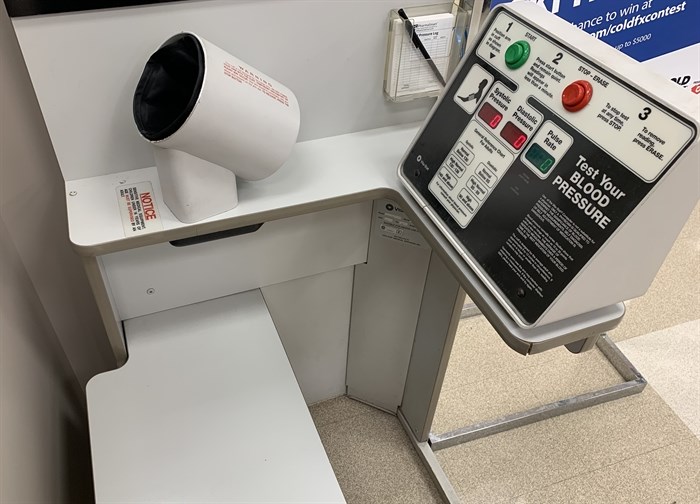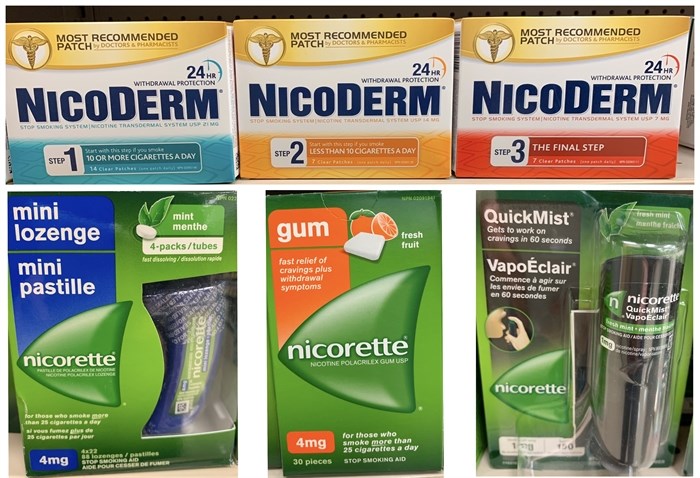
Most pharmacies offer free blood pressure tests, with stations equipped for personal use. Follow the instructions and be sure to follow up with a doctor if your results are out of range.
(LARRY FISHER / iNFOnews.ca)
February 03, 2020 - 8:00 AM
New Year, new me. That is the popular phrase for the age-old tradition of setting New Year’s resolutions.
For many, that means eating better, exercising more or stopping smoking. For most, the goal is to get healthier in some way, shape or form.
Physical appearance might be the motivation for those lifestyle changes, but all these resolutions will provide positive results for a person’s heart.
“Inadvertently, as a byproduct, they get heart healthy,” Kristina Gifford, manager of Kipp-Mallery Pharmacy in Kamloops, said of the common bond among those who've made resolutions. “Of course, keeping your weight down is also good for your heart. Staying active is good for your heart. And not smoking is definitely good for your heart.”
There has never been a better time to butt out, with plenty of incentive from the B.C. government through the Smoking Cessation Program.
“People can come in and get 12 weeks of smoking cessation products free of charge to assist them in their quest to stop smoking. And you don’t need a prescription for that, your pharmacist can get you set up,” said Gifford, noting nicotine replacement therapy ranges from patches to gum and inhalers to lozenges — all of which are available at Kipp-Mallery stores.

There are several smoking cessation products available at local pharmacies, including the three-step NicoDerm patches as well as the Nicorette lozenges, gum and inhalers.
(LARRY FISHER / iNFOnews.ca)
“You can get one type each month for three months, and it doesn’t have to be the same type for all three months. You can start with patches and then if you’ve weaned yourself off, you can move to gum or lozenges if you just need something for the odd craving now and again,” she explained.
“There are also prescription items (Zyban or Champix) that you can get that will be covered — that aren’t typically covered — for up to 12 weeks.”
Smoking has harmful effects on the lungs — which are well documented — but also negatively impacts the heart to a similar degree.
“Smoking increases your risk of developing heart disease. You can get a build-up of plaque in your arteries. It increases your risk of blood clots. In general, it just makes your heart work harder,” said Gifford. “It is hard on your cardiovascular health.”
Conversely, exercise gets the heart working in a good way. And that can start with some practical steps.
“You could go for a brisk walk around the block on your lunch break. Taking the stairs instead of the elevator. If you’ve got pets, take your dog for a walk. All those kind of things are going to increase your physical activity, which is important,” said Gifford. “That helps you keep your weight down or to lose weight, and that is really good for your heart as well.”
Embarking on a more formal or rigorous fitness routine can feel daunting but should be fun, first and foremost. Especially for those who have made a resolution.
“It’s finding something that you enjoy, so that you are more likely to carry it on and not just do it for a couple of weeks, then go ‘yeah, I don’t want to do that anymore,’” said Gifford. “Some people will take dance lessons, some people love to go to the gym and run on a treadmill, some people hate running on the treadmill. There are barre classes, which has become a big thing in the last little while for strength and training. There are a billion different types of yoga that you can do."
“There is always new and interesting physical activity things. It is just finding something that you find interesting.”
Baby steps at the beginning and grow it from there. That is one of the keys to avoid getting discouraged in the early stages.
“You don’t have to go out and run a marathon, walking is a really good form of exercise,” reiterated Gifford. “You want to get about 150 minutes a week of exercise of some sort. You don’t need to do an hour’s worth all at once but a minimum of 10 minutes at a time and work your way up."
“People are always coming in saying ‘I want to lose weight’ or ‘I want to get healthy, what can I do?’ Exercise is a big piece of that.”
When it comes to eating better — or eating right — Gifford said “having a well-rounded diet is your best way to go, as opposed to using supplements. It is better to just eat a balanced diet than it is to take a whole bunch of supplements and vitamins — and it is usually a whole lot cheaper too.”
Beyond the obvious resolutions, limiting and managing stress is also beneficial for heart health.
“Prolonged stress, like if you have a job that is super stressful and you are stressed day in and day out, that is really hard on your heart,” said Gifford. “If you have a ton of stress in your life, regardless of your age, you should get your blood pressure checked.
“You can go into pharmacies or other stores that have those blood-pressure machines and you can check it yourself. It will tell you what the appropriate levels are, so you know whether you are in range or not. And if you find that your blood pressure is high, you definitely need to get that checked out because it is really hard on your body.”
As for getting physicals and specific heart tests, Gifford said “if you are younger, under the age of 40, unless you are overweight or you are having issues that bring you to the doctor, it’s not super important. Once you hit the age of 40, it’s always good to go and ask for some bloodwork — get your cholesterol checked and check your blood sugars and all that good stuff.”
Sponsored By 
News from © iNFOnews, 2020